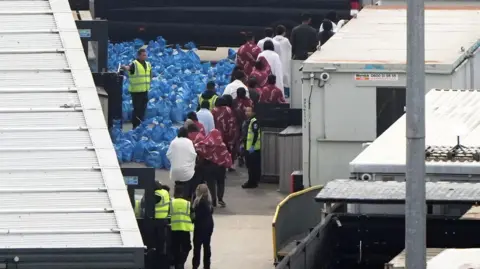On June 1, 2025, an alarming event unfolded in the English Channel as more than 1,100 migrants successfully crossed into the United Kingdom. This marked a significant uptick in migrant activity, with official reports indicating that 1,194 individuals arrived in 18 small boats that day alone, a record high for 2025. Both the growing number of migrants making this perilous journey and the challenges they face have raised pertinent questions about border control and immigration policies in the UK.
Recent statistics from the Home Office underscore the dramatic increase in migrant arrivals—the total number for the year reached 14,811 by early June, reflecting a staggering 42% rise compared to the previous year and a striking 95% increase from 2023. These numbers suggest that the ongoing trend of migrant crossings could set a new record, especially given that previous years have seen significant influxes. For instance, nearly 37,000 people crossed the channel in 2024, while the peak was observed in 2022 with over 45,755 arrivals.
The Defence Secretary, John Healey, characterized the situation as part of a broader pattern of lost control over borders, attributing this to the mismanagement of immigration policies over recent years. In an interview on Sky News’ Sunday Morning with Trevor Phillips, Healey expressed deep concern about the implications of these crossings, describing the scenes of migrants being transported by smugglers as “shocking” and reminiscent of a taxi service bringing people into the UK.
Tracing back to historical data, the highest number of daily arrivals recorded since the data collection began in 2018 was noted on September 3, 2022, when 1,305 migrants made the crossing. With the evolving dynamics around this issue, the government is under increasing pressure to reassess its approach. Healey mentioned existing agreements with French authorities, highlighting that they had rescued 184 individuals attempting the dangerous journey on the same day that 1,194 others arrived in the UK. The Secretary emphasized the urgency for French officials to improve operational measures, suggesting they should intervene and stop smugglers before migrants even reach the water.
In response to the escalating crisis of dangerous crossings, a spokesperson from the Home Office reiterated the government’s commitment to dismantling people-smuggling networks and improving border security. The spokesperson condemned these smuggling gangs, claiming they exploit vulnerable individuals seeking better lives without regard for their safety. This sentiment echoes a growing narrative around the need for comprehensive reform to address the complexities of migration, especially in light of the dangers posed by small boat crossings.
The rising numbers of crossings and the associated risks highlight broader issues tied to migration and asylum policies. There is an evident need for a cohesive strategy that addresses both humanitarian concerns for migrants as well as the imperative of safeguarding national borders. The government’s stance underscores a dual focus on stopping dangerous crossings while also grappling with the legal and moral obligations towards individuals seeking refuge.
As the situation unfolds, discussions around migration are intensifying within British society. Calls for action by various stakeholders, including policymakers, community leaders, and advocates for migrants, highlight the challenging balance between ensuring safety and providing sanctuary. As the UK navigates these turbulent waters, it remains to be seen how new policies will shape the landscape of migration in the months and years to come.



